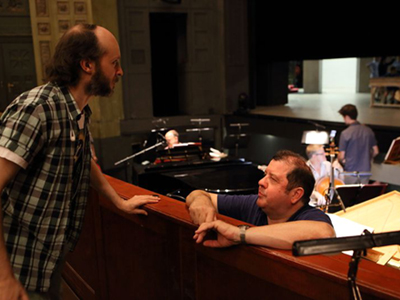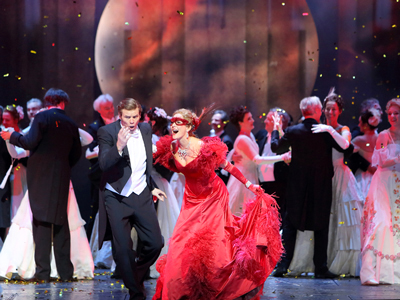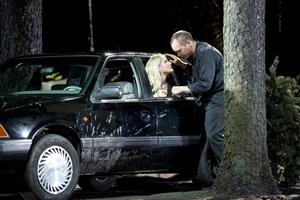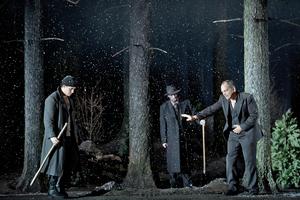
By ANDREW POWELL
Published: August 7, 2016
MUNICH — Two evenings after an “Allahu Akbar” eruption here cost nine mostly teenage, mostly Muslim, lives, it felt perverse to indulge in 280-year-old French escapism stretching to Turkey, Peru, Iran and the future United States.
But there we were July 24 in the Prinz-Regenten-Theater for Bavarian State Opera business-as-usual, a festival yet, and Rameau’s four-entrée Les Indes galantes as imagined by Sidi Larbi Cherkaoui, the Belgian choreographer with stage-director pretensions.
And safer we were, too, than at a smaller music festival 110 miles away near Nuremberg, the outdoor Ansbach Open, where a Syrian refugee denied asylum in this country was preparing to explode his metal-piece-filled backpack among two thousand listeners. (As luck would have it, Germany’s first suicide bomber killed only himself when he detonated only his detonator and did so outside the festival’s gates, not having known in advance he would need a ticket.)
Before departing for Turkey, the opéra-ballet states its premise by means of a prologue: European lovers pressed to exchange Goddess Hébé’s doux instants (sweet moments) for Goddess Bellone’s gloire des combats can count on intercession from a third god, Amour, as they “traverse the vastest seas” in military service.
This plays out with amusing dramatic variance* in the four locales to music of beguiling harmony and bold instrumental color, in airs, vocal ensembles, choruses and dances. The U.S. entrée concludes with the Dance of the Great Peace Pipe (penned after Agapit Chicagou’s 1725 Paris visit), minuets, a gavotte, and a most charming chaconne.
If you kept your eyes closed, the performance was a treat. Opening them invited confusion, or worse, despite Cherkaoui’s fresh dance moves, tirelessly executed by his Antwerp-based Compagnie Eastman.
Ivor Bolton and the Münchner Festspiel-Orchester, an elite Baroque pick-up band, served Rameau with verve and expressive breadth, ripe string sound and fabulous wind playing. The Balthasar-Neumann-Chor from Freiburg managed its musical challenges neatly, in opaque French.
The score’s 17 roles went to ten generally stylish soloists. Lisette Oropesa proved a graceful musician in the lyric soprano duties of Hébé and Zima. Anna Prohaska, as Phani and Fatime, stopped the show with a divinely phrased Viens, Hymen, viens m’unir. Light tenor Cyril Auvity sang artfully as Valère and Tacmas, while John Moore’s baritone lent a golden timbre to the sauvage Adario. Reveling grandly in the music’s depths were basses François Lis (Huascar and Alvar) and Tareq Nazmi (Osman and Ali).
But soprano Ana Quintans encountered pitch problems as Amour and Zaïre; Elsa Benoit, the Émilie, seemed squeezed by Rameau’s nimble turns; Mathias Vidal pushed harshly for volume in the tenor roles of Carlos and Damon; and bass Goran Jurić, in drag as Bellone, muddied her vital rousing words.
As for the staging, new on this night, conceit and a ruinous idea got the better of Cherkaoui (and BStO managers, who should have intervened if they care about Baroque opera as they profess): he would thread together the prologue and entrées into one dramatic unit. Characters would appear in each other’s sections, mute. Opéra-ballet form be damned.
In place of exotic lands (requiring exotic sets and costumes), the viewer would journey from schoolroom to museum gallery to church to flower shop, to no place, to some closed border crossing. The spectacle of Peru’s Adoration du Soleil, for instance, would unfold in the church. Woven throughout, clumsily, would be tastes of the plight of Europe’s present refugees, and Europeans’ poor hospitality. Count the ironies.
[*In Turkey a melodrama, as the shipwrecked lovers’ fate turns on Osman’s magnanimity (Le turc généreux). In Peru a tragedy, as the couple’s freedom results from Huascar’s molten-lava death (Les incas du Pérou). In Iran a bucolic, as two pairs of lovers ascertain their feelings through disguise and espial (Les fleurs, original version of Aug. 23, 1735). In the U.S. a comedy, as noble savage Zima flirts with and mocks two European colonists, reversing the pattern, before homing in on loving native Adario (Les sauvages).]
Photo © Wilfried Hösl
Related posts:
Portraits For a Theater
Nitrates In the Canapés
Harteros Warms to Tosca
Blacher Channels Maupassant
On Wenlock Edge with MPhil




Widmann’s Opera Babylon
Friday, November 23rd, 2012By ANDREW POWELL
Published: November 23, 2012
MUNICH — Scorpion-Man prowls the rubble of an unnamed flattened city at the start of Babylon, Jörg Widmann’s new opera, wailing as he moves. We should care.
Seven scenes, a Hanging Garden interlude, and three costly theater hours later, he is back, doing his thing over the same debris, also multiplying himself, and alas we have not cared or even learned what he represents. Perhaps he is us sad cityites, predatory and detached from our souls.
Widmann’s librettist for this Bavarian State Opera commission (heard and seen Oct. 31) is the post-humanist philosopher Peter Sloterdijk, whose worries, intra-urban and intra-galactic, drive Babylon in one big circle against the backdrop of the 6th-century-BC Jewish exile.
Sloterdijk’s narrative feebly pivots on a love-interest, in the persons of exile Tammu and local priestess Inanna. The character Soul is catalyst in a progression of these two that ends, before the circle has closed, in a concordance of Heaven and Earth (cue sweet music).
Along the way, Tammu gets drugged, laid, sacrificed, resurrected, and flown away with his gal in a spaceship. After administering the drug and enjoying her man, Inanna’s one job is to descend post-sacrifice into the Underworld and retrieve him, being sure not to lose sight of him as they make their way out together.
If this suggests a too-rich stew of Isolde or Norma and Euridice with Tamino, it is. But we are in Babylon, and your bowl arrives as the Euphrates overflows, the New Year rings in at the Tower of Babel, and Ezekiel dictates the Word of God, not to list the antics of seven Sloterdijk planets and fourteen Poulenc-ish sex organs.
Born here in 1973 and locally esteemed, Widmann as composer is much identified with Wolfgang Rihm, one among several teachers and influences. He is, besides, a bold and expressive clarinetist: a 2012 Salzburg Festival performance of Bartók’s Contrasts with Alexander Janiczek and András Schiff all but vaulted off the Mozarteum’s platform, and a 2011 Munich partnership with the Arcanto Quartet found rare vigor as well as cozy plushness in Brahms’s Clarinet Quintet.
The Nabucco-era subject had taken the composer’s fancy long ago. Ideas sprouted. A raucous Bavarian-Babylonian March emerged as orchestral fruit last year, bridging the millennia if not exactly the cultures. At some point came the link with Sloterdijk and the decision to plough forth with an opera, Widmann’s sixth piece for music-theater.
Undaunted by the librettist’s loony layers, Widmann supplies for Babylon music of chips and shards and sporadic mini-blocks. 160 minutes of it.
He savors direct quotes, splintered just past the point of identifiability. These he takes from jazz, operetta, lute song, Baroque dance, cabaret, Hollywood, symphonies, band repertory. He crafts brief, pleasingly original blocks of sound in various forms — brass swells, percussive glitter, choral refrains, woodwind banter — deploying them to varying effect. He is a gifted colorist, writing with virtuosity for all sections of the orchestra, in this case a large one, heavy on low winds and percussion.
Vocally the writing is less fluent, less confident. Abrupt ascents are a peculiarity. The tessitura of all three principal roles — Inanna, the Soul and Tammu — lies coincidentally high for each of the voice types (two sopranos and a tenor). Vocal lines are often aborted, mid-flight, again producing small blocks.
Widmann’s chipboard elements are arrayed in rapid indigestible sequences some of the time (Scene III’s orgy). Elsewhere, thin writing overstays its welcome or fails to develop in sync with the cosmic-Biblical scheme (Scene V) — the “prolix musical treatment” George Loomis noted in his review.
Enter Carlus Padrissa, the busy Spaniard known for constant stage movement. Hired to define and motivate the opera’s characters and unite the threads in text and score, Padrissa delivers, well, movement.
The gloomy arthropod’s rubble swiftly morphs into moveable letterpress type: Cuneiform, Katakana, Cyrillic, Hebrew — ah, Babel, the universal translator — to be piled up by mummers, piled down, carried off, brought on. Nearly incessantly. Flown and raised platforms support and transport sundry participants, some of them needed. Projected screen-saver lines depict the restless Waters of Babylon. Moving photographic images reveal holy verse, hell fire, a meteor (or ICBM) crashing to Earth. There is always plenty to watch.
Still, two problems dog Padrissa’s circus-like approach to opera, evident in his 2007–9 Valencia Ring and 2011 Munich Turandot: movement everywhere deprives the action of focus; and physical space required for upstage activities (open wings, as in ballet) deprives the singers of sound boards (in the form of sets) to reflect and project their voices. So it is with Babylon.
In the Turandot — due by chance for Internet streaming in its revival on Sunday (Nov. 25), here, and significant for the textual decision to end where Puccini ended — the voice-projection problem is addressed by having much of the principal singing occur drably near the stage apron.
In Babylon it is addressed with amplification*, subtly on the whole, though on Oct. 31 individual vocal lines resounded unnaturally at several moments.
Generalmusikdirektor Kent Nagano brought to the new opera his dual virtues of judicious tempos and attention to balances. The orchestra played compliantly, David Schultheiß working as poised and able concertmaster. Anna Prohaska and Claron McFadden coped deftly with the vocal stratosphere as Inanna and the Soul. Gabriele Schnaut brought rolling majesty to the Euphrates personified. Countertenor Kai Wessel exuded glum fortitude as Scorpion-Man. Jussi Myllys, the Tammu, relished having more to do than in his numerous recent Jaquinos, serving Widmann’s music earnestly. Willard White, as Priest-King and as Death, growled and boomed with his customary expertise.
When final blackness came, the polite Bavarian audience registered its ennui not with boos but with the barest, most ephemeral applause. Reconciling Heaven and Earth had proven easier than reaching across the proscenium.
[*Bavarian State Opera in a Nov. 26 message noted that “amplification was used for some parts” of the opera and that Widmann “actually marked the use of amplification for the scenes with heavy orchestral instrumentation in the score.”]
Photo © Wilfried Hösl
Related posts:
Levit Plays Elmau
Petrenko Hosts Petrenko
Manon, Let’s Go
Tonhalle Lights Up the Beyond
Mélisande as Hotel Clerk
Tags:András Schiff, Anna Prohaska, Arcanto Quartet, Babylon, Bavarian State Opera, Bavarian-Babylonian March, Bayerische Staatsoper, Carlus Padrissa, Claron McFadden, Commentary, David Schultheiß, Gabriele Schnaut, Jörg Widmann, Jussi Myllys, Kai Wessel, Kent Nagano, München, Munich, Peter Sloterdijk, Review, Rihm, Willard White
Posted in Munich Times | Comments Closed